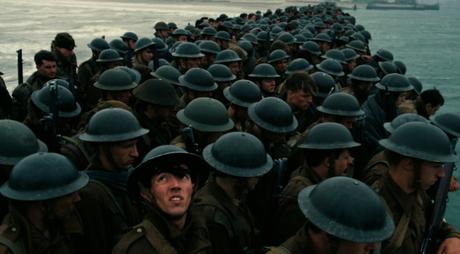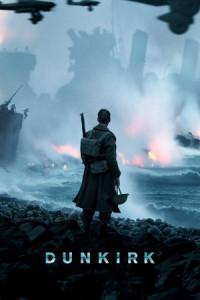
Review: In Dunkirk, Christopher Nolan reenacts a pivotal WWII moment dubbed as 'Operation Dynamo' a.k.a. 'Miracle of Dunkirk' as an epochal non-victorious, non-Americanized spectacle in only 106 minutes-making it his shortest but also most precise and concise tenure. It might be a fact-based war film the auteur unlikely to make; yet, Dunkirk is still a Nolan epic through and through-with inventive storytelling, heartfelt tension and Nolan's math.
It's 1940 where approximately 400,000 allied soldiers of British Empire and France were cornered in a French beach town, Dunkirk; in a literal "between the Devil and the deep blue sea" circumstance. What separates those defenseless soldiers and home are only Nazis following from the land behind, Nazis bombing from the air above, Nazis torpedoing over the sea and the freezing 100 kilometers of sea. Rescue ships cannot reach the shore; only private boats, yachts and civilian tugboats can reach the ground. On the brink of a colossal loss, miracle only happens when home comes to those men who cannot go home.
Nolan infuses the story with minimum background information but common title cards on the historical event. To compensate that, Nolan scheme Dunkirk as a mood-faltered war blockbuster. Dialogues are minimal; names are mostly unknown (unless you're paying more attention to details); enemies are never visually seen; and Hoyte van Hoytema's stark pictures are the only messenger to deliver the austere horror of being in the middle of a futile war. That way Dunkirk effectively crafts tension and a more ominous sense of urgency-as adorned with Hans Zimmer's heart-pounding, clock-ticking, strings-raging score.
To double the ominous tension and sense of urgency, Nolan structures Dunkirk as an inventive non-linear narrative like never before. His fascination towards time constraint and his penchant of precision intertwine in this new structure by employing three timelines spread in three basic POVs at different durations. By simple means, those three timelines takes place in three different locations during the operation: in the land-or in the mole to be specific, young soldiers (Fionn Whitehead, Aneurin Barnard and the eponymous Harry Styles) are escaping the beach in a week time; in the sea-Mark Rylance's eager yacht owner and his son are going on the rescue; and, in the air-Tom Hardy's Spitfire pilot is hunting down Nazis bombers and fighters. Those three timelines intercut at some points and perspectives overlaps bolstering the battle's climactic emotion drives.
What makes Dunkirk distant from other Nolan's works is its perspective towards emotional height. In other Nolan films, the unorthodox narrative culminates in mind-boggling emotion drives in a way that those complexities are covering and/or foreshadowing the sensitiveness at the core. Dunkirk doesn't display those drives at any similar height, partially because it's a depiction of real-life events. There's no sense dramatic overdo, hence no sophisticated character development, which settle with the film's compact duration. In that sense, the ensemble of cast plays out effective, precise performance without going grandeur. Rylance, Hardy, Kenneth Brannagh, and, even Nolan's muse, Cillian Murphy have their respective role efficiently drawn in the story. While younger talents like Whitehead and Styles are proven not to be Nolan's babes, but working tool to his clinical precision.
In Dunkirk, the story is a greater grandiosity than anything else. There's no sweet victory to flaunt or no faux patriotism to boast off; there's only respect-for those who had endured the horror-to pay in the most inventive way. Not only Nolan has outdone himself at some particular ways, he has retained his auteurism with pride.
Dunkirk (2017)


Action, Drama, History Written & Directed by: Christopher Nolan Starred by: Fionn Whitehead, Mark Rylance, Tom Hardy, Cillian Murphy, Kenneth Branagh, Harry Styles Runtime: 106 mins Rated PG-13
